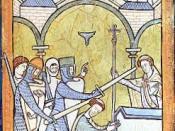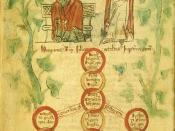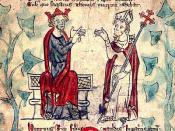Kenny Nam
Thomas Becket vs Henry II
The High Middle Ages was a time of power struggles between the Church and the State. Increases in royal power and expeditions like the Crusades symbolized the teeter-totter of the balance of power between the two foundations, and a prime example of the fight for power is the conflict of Henry II, King of England, and Thomas Becket, Archbishop of Canterbury.
Henry II gained his throne thanks to the efforts of his mother, who fought to maintain her family's stature in the royal family tree. Thomas Becket was the son of a wealthy London merchant, and lived a life of no worries. Theobald, the Archbishop of Canterbury at the time, recognized Becket's intelligence, and he was put under Theobald's church tree. There, Becket gained experience and serious attention from his great successes as the Archbishop's trusty servant, and King Henry II laid an eye on him also.
Seeing Becket's potential intelligence, Henry II appointed Becket to the position of Chancellor of England. In England, the Chancellor was second-in-command only to the King. Any man of this stature was given great power, and any man placed in this position must be able to match his expectations. Henry's instincts were accurate, and Becket performed amazingly at his new position. He revolutionized how England's government was run, and turned the quiet castle into a busy place of work. Becket's fame rose instantly, gaining attention from all over England, and quickly gained the reputation of being Henry's greatest loyal worker.
Becket, aside from being Henry's most trustworthy servant, also became Henry's greatest friend. Henry frequently visited Becket for dinner, and the two would discuss issues and exchange ideas almost every night. Henry was able to derive one conclusion from their dinner sessions ÃÂ Thomas Becket was...


